Do you have a question about the Toyota Tacoma 2000 and is the answer not in the manual?
Provides an overview of the vehicle's instruments and controls.
Details the components and layout of the instrument panel.
Explains the instrument cluster layout with a tachometer.
Lists and explains various indicator symbols found on the instrument panel.
Covers the operation and function of keys and vehicle doors.
Details the use and care of vehicle keys and the key number plate.
Explains how to lock and unlock the side doors using the key.
Explains the operation of power windows, including automatic operation.
Explains how to open, close, and secure the tailgate.
Provides instructions on how to open and close the vehicle hood safely.
Covers safety precautions and operation for the detachable moon roof.
Covers the operation of seats, seat belts, steering wheel, and mirrors.
General guidelines for proper seating and seat belt usage for all occupants.
Crucial precautions and advice on the proper use of seat belts for all occupants.
Details the operation and purpose of SRS airbags for driver and front passenger.
Urges the use of child restraint systems appropriate for the child's age and size.
Instructions on how to adjust the steering wheel angle for comfort and control.
Guidance on adjusting outside rear view mirrors for optimal visibility and safety.
Covers the operation of headlights, turn signals, wipers, and washers.
Operation of headlights, turn signals, high/low beams, and the light reminder buzzer.
Operation of emergency flashers to warn other drivers in hazardous situations.
Operation of windshield wipers and washers, including intermittent settings.
Overview of gauges, meters, and service reminder indicators.
How the fuel gauge works and indicates the fuel level remaining in the tank.
How to use the tachometer to monitor engine speed and select shift points.
Explains various indicators and buzzers that signal service needs or system status.
Covers ignition switch, transmission operation, and parking brake.
Explains the ignition switch positions and the steering lock mechanism.
Details the operation of the automatic transmission, including overdrive switch.
Correct procedure for parking the vehicle, including using the parking brake.
How to rock the vehicle free if it becomes stuck, with safety precautions.
Operation of the electronically controlled automatic transmission for 2WD models.
Explains the shift pattern and recommended shifting speeds for manual transmissions.
How to select transfer modes (H2, H4, N, L4) using the front drive control lever.
Explains the rear differential lock system and its use on slippery surfaces.
How to set and release the parking brake and its reminder light.
Introduction to cruise control, its operation, and safety precautions.
Overview of the vehicle's car audio system, including references and usage.
How to use preset buttons to tune and store radio stations.
Operation of cassette player features like program, fast forward, rewind, and auto-reverse.
Explains error messages displayed by the CD player and how to resolve them.
Using random playback features for discs and cassettes.
How to scan radio frequencies or preset stations.
How to tune radio stations using the electronic tuning radio (ETR).
Tips for operating the audio system, including radio reception issues.
Overview of the air conditioning system, including controls, settings, and tips.
Visual guide to different air flow selector settings and vent usage.
Practical tips for using the air conditioning system effectively in various conditions.
Recommended control settings for effective heating, including quick heating and defrosting.
Recommended control settings for effective cooling and quick cooling.
How to defog the inside of the windshield using A/C and air flow settings.
How to defrost the outside of the windshield using air flow and temperature settings.
Covers various other equipment like clock, lighter, glove box, cup holder, and floor mat.
How to set and reset the digital clock, and its display characteristics.
Explains the use of power outlets for accessories, with capacity and usage notices.
How to use the cup holder, including the second holder and safety precautions for Xtra-cab models.
How to use the correct size floor mat and secure it with locking clips.
General precautions for driving a 4WD vehicle off-road.
Detailed precautions for 4WD and Pre Runner models regarding rollover risk and handling.
Recommendations for breaking in a new vehicle for optimal long-term performance.
Information about fuel type, octane rating, and unleaded gasoline requirements.
Explains the function of the three-way catalytic converter and its types (LEV vs. non-LEV).
Safety precautions regarding engine exhaust, carbon monoxide, and ventilation.
Explains normal engine oil consumption and factors affecting it.
Explains the function of the anti-lock brake system and its warning light.
Guidelines for safely stowing luggage and cargo to maintain vehicle balance.
Explains summer, all-season, and snow tires and their suitability for driving conditions.
Pre-driving checks to ensure the vehicle is safe and ready to operate.
Normal starting procedure for cold and hot engines, and what to do if the engine stalls.
Advice for driving in different conditions like crosswinds, hills, wet roads, and cold weather.
Precautions for operating 4WD and Pre Runner models off-road, focusing on safety and vehicle protection.
Advice for winter driving, including engine coolant, battery, oil viscosity, and door locks.
General advice on trailer towing, its effects on vehicle handling, and weight limits.
Driving tips for towing trailers, focusing on speed, distance, braking, and turning.
Tips for improving fuel economy and vehicle longevity through driving habits.
Troubleshooting steps if the vehicle fails to start.
What to do if the engine stalls while the vehicle is in motion.
Steps to take if the engine overheats, including safety and coolant checks.
Procedure for safely changing a flat tire, including vehicle preparation and jacking.
Lists and shows the tools and spare tire required for changing a tire on normal cab models.
Detailed steps for removing and installing wheels and tires.
How to reinstall wheel nuts finger-tight and then fully tighten them.
Instructions for safely lowering the vehicle after changing a tire.
General recommendations and precautions for towing the vehicle.
Emergency towing procedures for 2WD models using cables or chains, with cautions.
Emergency towing procedures for 4WD models using cables or chains, with cautions.
Methods for towing a stuck vehicle, including removing debris and placing stones under tires.
How to use the shift lock override button to shift out of Park for column shift transmissions.
How to use the shift lock override button to shift out of Park for floor shift transmissions.
What to do if you lose your vehicle keys and how to obtain replacements.
Information on preventing corrosion through proper vehicle care and maintenance.
Step-by-step guide for washing and waxing the vehicle for finish maintenance.
Precautions for cleaning the vehicle interior, especially the floor, to avoid damage.
How to clean carpets using foam shampoo, with tips for keeping them dry.
How to clean leather upholstery using neutral detergent and protect it from damage.
An introduction to do-it-yourself maintenance, covering engine compartment and fuses.
Explains the importance of regular maintenance for vehicle performance and warranty.
Lists general maintenance items to be checked regularly, both inside and outside the vehicle.
General safety precautions and advice for performing DIY maintenance.
Covers various do-it-yourself maintenance tasks for the engine and chassis.
Step-by-step instructions for checking the engine oil level, including oil selection and quantity.
How to check engine coolant level, add coolant, and identify potential leaks.
How to check brake fluid level, add fluid, and precautions for handling brake fluid.
Instructions for checking tire pressure, including when to check and using a tire pressure gauge.
How to check tires for wear and damage, and guidelines for tire replacement and wheel balancing.
Explains the importance and procedure for rotating tires to equalize wear and extend life.
Guidance on when to use snow tires or chains, and how to install them correctly.
When to replace wheels due to damage, and precautions for selecting replacement wheels.
Covers do-it-yourself maintenance for electrical components like the battery and fuses.
Safety precautions and emergency measures when checking the battery.
Safety precautions and procedures for recharging the vehicle battery.
How to check and replace fuses, including using spare fuses and substitutes.
How to replace light bulbs, including safety precautions for halogen bulbs.
Lists the dimensions and weight specifications for different Toyota Tacoma models.
Provides specifications for the 2RZ-FE, 3RZ-FE, and 5VZ-FE engines, including bore, stroke, and displacement.
Details fuel type, tank capacity, engine oil grade, and recommended viscosity.
Provides engine service specifications like valve clearance, spark plug type/gap, and drive belt tension.
Tire sizes, recommended pressures, and wheel nut torque specifications.
Lists fuses by type and their corresponding circuits in the engine compartment and instrument panel.
How U.S. owners can report safety defects to NHTSA and Toyota.
Explains DOT tire quality grades: Treadwear, Traction, and Temperature.
Details traction and temperature grades for tires and information for truck-camper loading.
Recommended locations for cargo center of gravity for weight ratings.
Lists cargo weight ratings for different cab and drive models, with a caution on overloading.
Explains Gross Axle Weight Rating (GAWR) and Gross Vehicle Weight Rating (GVWR) and their importance.
Troubleshooting steps if the vehicle fails to start.
What to do if the engine stalls while the vehicle is in motion.
Steps to take if the engine overheats, including safety and coolant checks.
Procedure for safely changing a flat tire, including vehicle preparation and jacking.
Detailed steps for removing and installing wheels and tires.
How to use the shift lock override button to shift out of Park for column shift transmissions.
How to use the shift lock override button to shift out of Park for floor shift transmissions.
What to do if you lose your vehicle keys and how to obtain replacements.
Information on fuel type, tank capacity, engine oil, and tire information.
Owner's responsibility for performing specified and general maintenance.
Warnings about using non-genuine parts and modifying the vehicle, and warranty implications.
Driving tips for 4WD and Pre Runner models, emphasizing handling differences and rollover risks.
How to use the overdrive switch for better fuel economy and quieter driving.
| Brand | Toyota |
|---|---|
| Model | Tacoma 2000 |
| Category | Automobile |
| Language | English |
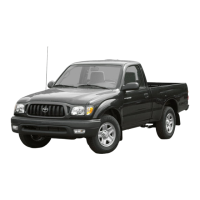

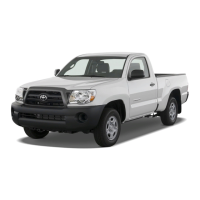
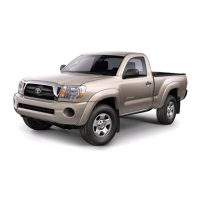
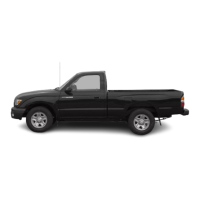


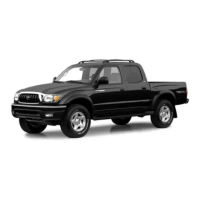
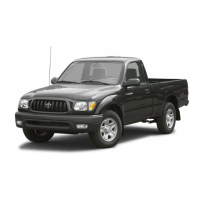
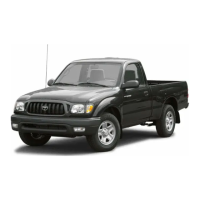
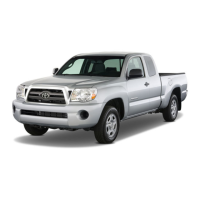
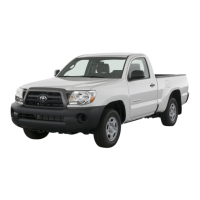
